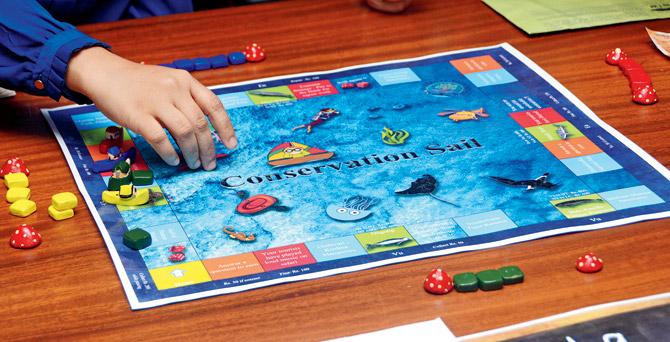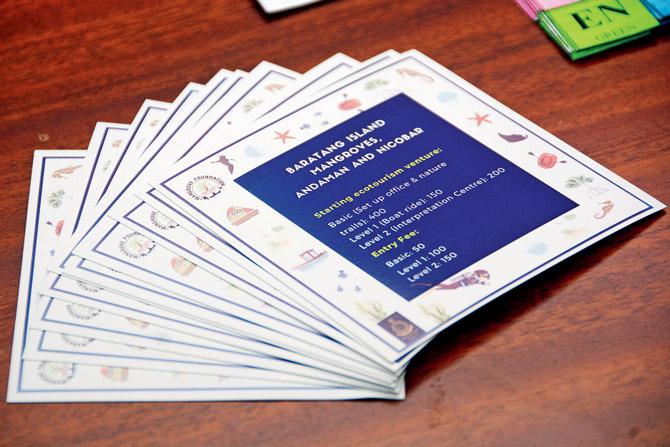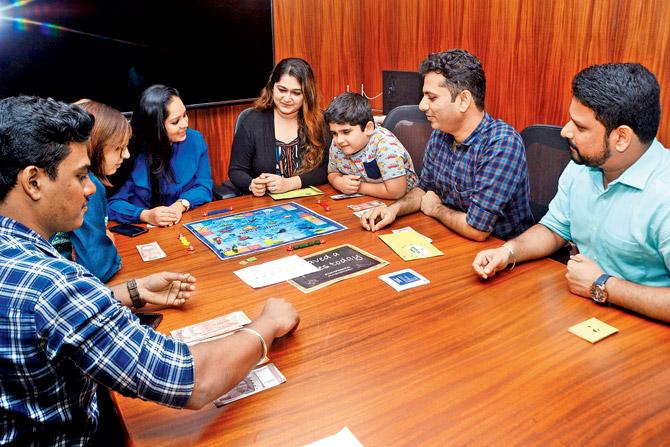Test your skills with a new board game by the Mangrove and Marine Biodiversity Conservation Foundation of Maharashtra that hopes to raise awareness about marine biodiversity and species conservation

In recent years, ‘woke’ millennials have been credited with kickstarting several trends that have gone on to inspire lasting changes in how we think and live. It is only befitting, therefore, that five millennial minds at the Mangrove Foundation are melding two themes we presently feel strongly about — environmental conservation and board games — to create awareness about the importance of saving marine-protected areas and species in the country. The game that was released earlier this week is aptly named Conservation Sail. It invites participants to sail through India’s vast and varied coastline and experience its marine biodiversity. The flow is loosely based on Monopoly, where participants must compete to save various endangered indigenous species from extinction.
ADVERTISEMENT

The game is based on Monopoly, where participants compete to save endangered indigenous species
Gaming for change
“We were brainstorming ways to create more awareness among school and college students, and wanted to go beyond campaigns, and photo and drawing competitions. Being an avid board game enthusiast, I proposed creating one,” shares Siddhesh Surve (31), assistant director (capacity building) at Mangrove Foundation. His idea found resonance with his colleagues Vandan Jhaveri (34), Sheetal Pachpande (35), Moon Bhandari (31) and Hrishikesh Rane (25), who have contributed to the game’s dynamics and visuals, and have handcrafted elements, including the board, chips and tokens.
In the coming months, Surve and his team intend to invite groups of students from city schools and colleges to experience the game at the Coastal and Marine Biodiversity Centre in Airoli, Navi Mumbai. Here, they can also watch multimedia presentations and videos about marine life and conservation efforts. “We hope it inspires participants to put this knowledge to good use in the real world,” he said. The game has already quite a buzz on the Mangrove Foundation’s official social media pages, which invites players to register for a chance to experience the game in person. They also intend to offer board game enthusiasts and nature-lovers the chance to purchase their copy of the game.

Setting sail
We invited mid-day reader and board game-enthusiast Ayesha Ladha, 33, and her seven-year-old son Essa to join the game’s creators and us for an afternoon of Conservation Sail. Players familiar with Monopoly will recognise the game’s format — at the outset, each player is handed a sum of '1,500, six chips and a ship-shaped piece. We rolled the dice to move our ship through various boxes — you can build your own eco-tourism venture at a marine life hotspot such as the Sundarbans, get rewarded by the government for an important conservation initiative, answer a question to earn game ‘cash’ or be penalised for a ‘crime’ committed by a tourist visiting your resort. Each participant must build at least two two-level tourism ventures before (s)he can opt to save an endangered species such as a dugong or a whale shark. Here, the game intensifies the challenge by asking players to bring down the conservation status of the species in question by two levels. Each reduction costs the player '600. Players can add to their stash of cash by upgrading their eco-tourism ventures (thereby collecting more rent) and by answering environment-themed questions correctly.
Learning on board
The game took some getting used to in terms of familiarising ourselves with its various elements, although after two turns, we had found our groove. One of the game’s biggest strengths is how much it teaches you about indigenous species — we were surprised to learn, for instance, that the whale shark found off the coast of Kerala, Lakshadweep Islands and Saurashtra is the largest fish species in the world (blue whales are mammals, not fish) and that Mumbai has its own city bird (the coppersmith barbet). Paying up for thoughtless acts committed by errant tourists is a reminder about what not to do while on a nature trip. “I found it interesting how my son learned that saving the planet takes real-world cash. Each time we had to pay for fines, he realised that he was digging into his reserve, and was a step further from saving a species, and hence, winning,” shares Ladha. This game could easily require three to four hours, especially if you play the longer version where players compete to save the maximum number of endangered species.

(From left) Hrishikesh Rane, Moon Bhandari, Vandana Jhaveri and Siddesh Surve, with Essa and his mom Ayesha Ladha, play the game. Pics/Sneha Kharbe
Surve and his team were amenable to our suggestion of including more material about how the contributed funds could help protect the species in question, by way of cue cards. The game has been designed for students from grade seven upwards, which seems to be ideal as younger players (as was the case with us) could struggle to relate to some actions on the board, unless each step is patiently broken down. The game is in its early stages in terms of design and build, although Surve is keen to involve professionals to fine-tune the product. “We are still gathering inputs from players to simplify certain aspects so it becomes more enjoyable to reach an even wider audience.
AT Coastal and Marine Biodiversity Centre, 2, Diva Nagar Road, Mangrove Forest, Airoli, Navi Mumbai.
CALL 22694984/85
Time 10 am to 6 pm (closed on Fridays)
Log on to @mangrove_foundation (Instagram)
Catch up on all the latest Mumbai news, crime news, current affairs, and also a complete guide on Mumbai from food to things to do and events across the city here. Also download the new mid-day Android and iOS apps to get latest updates
 Subscribe today by clicking the link and stay updated with the latest news!" Click here!
Subscribe today by clicking the link and stay updated with the latest news!" Click here!






